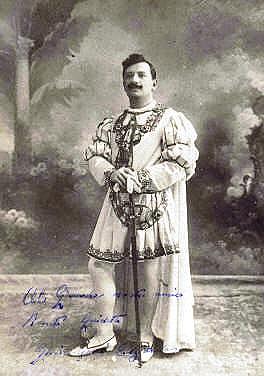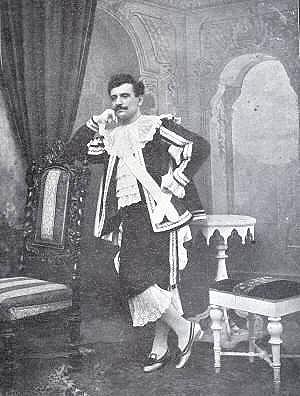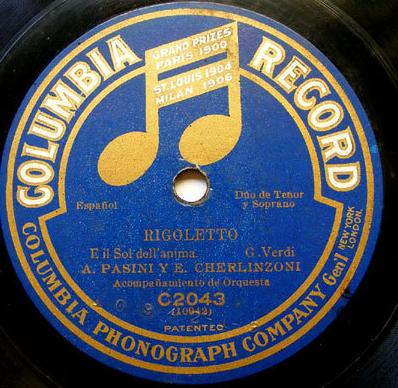Gherlinzoni worked as a shoemaker and simultaneously studied singing. Some months later, he made his debut
in an operetta company.
However the low pay convinced him to return to his old job. After a new attempt in the operetta world,
where he met his wife Fanny, he opened a food store which failed within a year.
After a period of
study, he finally made his debut as a lyric tenor.
Crucial was the meeting with the young conductor Tullio
Serafin who convinced him to dedicate himself to the study of Puritani, a work that characterized his career.
His career evolved as follows:
1903 Torino
1905 Savona, Parma (Reinach, 12 December:
Rigoletto with Enrico Pignatoro, Giuseppina Finzi Magrini,
Nazzareno De Angelis, Maria Vaccari, with Pietro Cimini conducting)
1906 Rimini, Imola, Milano (Dal Verme)
1907 Bari, Fiume, Lugo, Ferrara, Mantova, Trieste
1908 Modena, Padova, Bologna, Torino, Genova, Treviso, Trieste, Madrid
1909 Torino, St. Petersburg, Venezia, Torino, Palermo, Alexandria
1910 Forli, Ancona, Spoleto, Catania, Rovigo, Warsaw
1911 Bologna, Terni, Caropi, Parma (Reinach, 25 November: I puritani
with Carlo Molinari, Antonio Volponi, Antonio Pirrone, Bianca Morello, with Gino Puccetti conducting)
1912 Rimini, Bergamo, Casle Monferrato, Sanguinetto
1913 Novara, Ferrara
1914 Pistoia, Messina
1915 Messina
1916 Modena
1921 Bologna (concerto)
He
retired in 1918, but he continued to give occasional concerts in Bologna.
He died in poverty, few months
after the death of his second wife Teresa.
He had been away from the limelight for too many years, and was forgotten by everyone.
Today,
his remains rest at the Famedio for illustrious men at the cemetery of the Certosa in Ferrara.
His repertory included: I puritani, Rigoletto, La maschera, La traviata,
La Gioconda, La bohème, Mefistofele, Sarrona, Lucia di Lammermoor,
Saffo, ...


